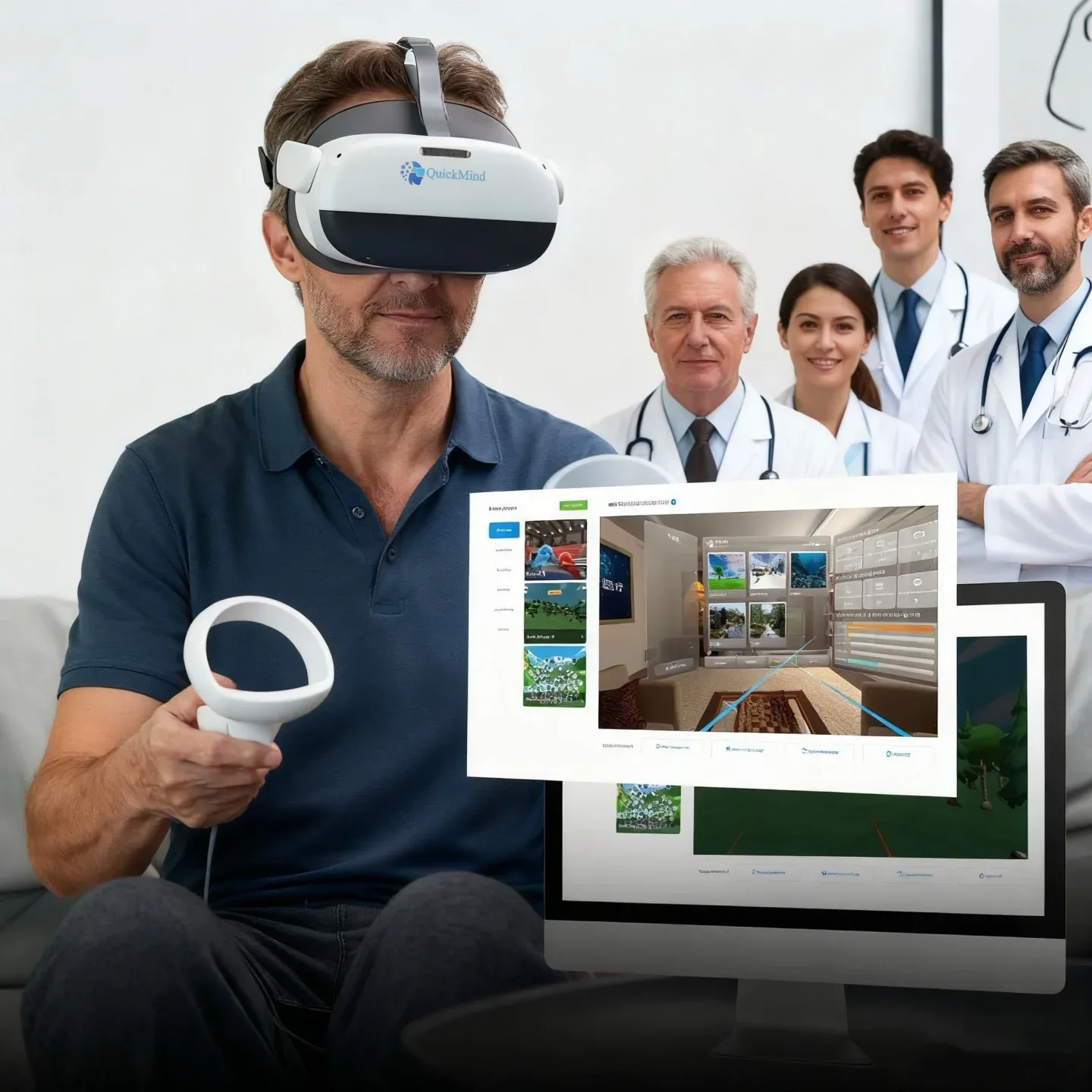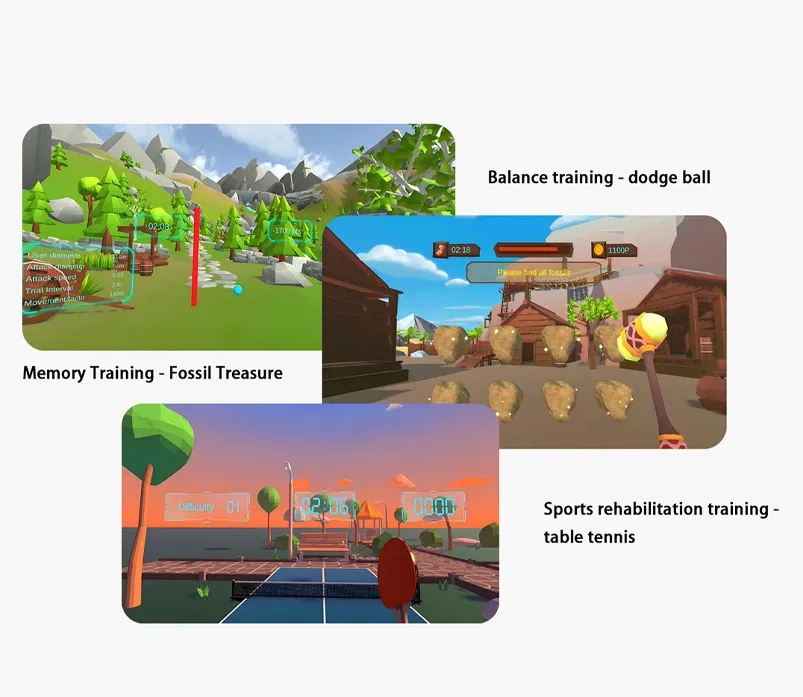
Emerging investigations indicates that computer-generated reality modality can substantially advance the states of individuals dealing with brain function deterioration. By taking them to relaxing atmospheres, VR presents a novel opportunity for mind energizing, psychological balance, and interpersonal communication. Several evaluations have proved that VR therapy can lower fretfulness, anxiety, and melancholy in dementia those diagnosed while also raising their cognition, mindfulness, and dialogue proficiency.
- VR allows subjects with dementia to reminisce esteemed pasts through hands-on simulations.
- Besides, it can allocate a harmless and helpful space for group interaction, fostering a realization of association and inclusion.
- Specialists hold that VR therapy has the capability to modernize dementia help by yielding new and state-of-the-art means to manage the challenging concerns faced by individuals diagnosed with this disorder.
Tech-Driven Cognitive Therapies for Alzheimer's Patients
Advancing computerized therapeutics are showing promise in the territory of mental capacity building for participants suffering from cognitive Alzheimer's illness. These programs employ digital innovation to activate brain activity and theoretically reduce the evolution of the disorder. Fun-packed regimens, personalized guidance, and intellectual training are some cases of processes being explored in this evolving discipline. While evaluations are being conducted, digital therapeutics afford a alternative means for strengthening the lives of those diagnosed with Alzheimer's ailment.Exploring Virtual Worlds: Innovative Methods for Alzheimer's Care
Pertaining to people facing cognitive Alzheimer's ailment, the steady erosion of recall and mental skills can markedly hamper their capacity to participate with the world around them. This harmful state often causes in separateness, upset, and a lowered personal identity. Current refinements in virtual reality technology show a transformative option to mitigate these issues by constructing immersive settings that can activate the brain and rekindle cognitive function.
Digital reality environments engineered specifically for Alzheimer's individuals can convey them in recognizable settings, such as their first house or a admired outdoor area, reminiscing positive memories and lessening anxiety. Through interactive assignments, these virtual worlds can also stimulate cognitive abilities like cognition, awareness, and decision-making.
The potential benefits of virtual reality in Alzheimer's intervention are extensive. Early analyses have established positive results, with participants demonstrating improvements in cognitive capacity, mood, and overall quality of life. As this mechanism proceeds, it holds the key to revolutionizing the way we approach Alzheimer's disease, making available a new pathway for management and uplifting.
VR Reminiscence Therapy for Alzheimer's Patients
Reminiscence therapy is a popular technique used to enhance cognitive function and emotional stability in individuals with Alzheimer's disease. This historic form of therapy involves prompting patients to share past experiences, often through narratives. However, a radical approach is emerging: VR-mediated reminiscence therapy.
This immersive technology utilizes virtual reality headsets to shift patients in faithful environments that bring forth memories from their past. By reliving these virtual scenes, individuals with Alzheimer's can connect with their past in a powerful way.
The Potential of Virtual Reality to Improve Memory and Cognition in Dementia
Virtual reality (VR) is emerging as a prospective resource in the fight against dementia, supplying state-of-the-art ways to energize memory and cognition. By creating immersive settings, VR can enable individuals with dementia access memories, take part in meaningful activities, and develop cognitive aptitudes. Studies have established that VR interventions can bring about noticeable improvements in memory recall, attention, and positional awareness. Moreover, VR provides a risk-free and positive space for individuals with dementia to display, reducing feelings of isolation and nervousness.
- Besides, VR can be configured to individual needs and preferences, permitting expanded levels of interaction.
- Considering the possibilities of VR, supplementary research is needed to fully understand its long-term efficacy in dementia care.
Recovering Recall and Connections: Virtual Reality's Social Benefits in Alzheimer's
Augmented immersive environments is emerging as a cutting-edge solution in the realm of Alzheimer's disease. By generating compelling and social realities, VR has the prospect to stimulate memories, develop social interaction, and improve the overall quality of life for individuals experiencing Alzheimer's. Prominently an impressive aspects of VR is its ability to transfer users to recognizable environments and events from their past. Whether it's a jaunt inside a childhood home or a reenactment of a beloved holiday, these virtual explorations can recall happy memories and strengthen cognitive power. Furthermore, VR can advance social interaction by linking individuals with others who share similar pastimes. This can be particularly constructive for people with Alzheimer's who may have trouble with traditional social contact. By hosting a safe and absorbing virtual space, VR can diminish feelings of isolation and loneliness, which are common among people diagnosed with Alzheimer's. Overall, VR holds immense promise for overhauling the lives of people with Alzheimer's by dementia reawakening memories, strengthening connections, and boosting their quality of life. As technology advances to advance, we can expect even more inventive applications of VR in the field of dementia care.Applying Cognitive Training: Employing VR Tools for Alzheimer's Care
Computer-simulated worlds is rapidly emerging as a transformative tool in the realm of cognitive training, particularly for individuals experiencing Alzheimer's disease. By immersing patients in interactive and engaging virtual environments, VR-based interventions can advance cognitive functions such as memory, attention, and problem-solving. These games routinely incorporate elements of storytelling, exploration, and social interaction, making the training process significantly appealing. Studies have shown that VR-based cognitive training can lead to measurable improvements in cognitive performance, potentially delaying the progression of Alzheimer's symptoms. Moreover, VR provides a safe and controlled environment for patients to practice new skills and enhance their confidence.
- Game-style methods in VR training can make it very enjoyable and involving for participants with neurological deficits.
- VR simulations can offer convincing scenarios that drive and improve cognitive functions.
- Personalized VR experiences can cater to unique demands and approaches.
Investigating VR Benefits in Dementia Management
Captivating digital environments offer a modern and encouraging avenue for users with cognitive impairments. These platforms can emulate familiar environments, allowing those affected by cognitive decline to recapture cherished memories and promote a sense of security. By easing the challenges of dementia, VR scenarios have the capability to upgrade quality of life for both individuals and their caregivers.
- Studies indicate that VR methods can noticeably impact cognitive function, affective well-being, and even kinetic abilities in individuals with dementia.
- Moreover, VR delivers a safe and managed environment for investigation, reducing the risk of danger.
- In addition, VR can support social communications by allowing individuals with dementia to engage in digital activities with others.
VR: A Promising Approach to Alzheimer's Diagnosis and Treatment
Alzheimer syndrome presents a sophisticated difficulty, often staying hidden in its early stages. However, virtual reality (VR) is unfolding as a innovative tool for identifying the disease at an early stage. Through immersive computer-generated settings, VR can examine cognitive capacity in ways that traditional methods find challenging to. This capability allows for early treatment strategies, potentially slowing disease progression and upgrading the quality of life for patients with Alzheimer's.
- Virtual reality evaluations provide cognition, focus, and orientation testing within secure and managed environments.
- Personal VR platforms promote user engagement in cognitive enhancement practices.
- VR worlds offer empathetic environments for interaction among those affected by Alzheimer's.
Facilitating Dementia Communication and Interaction Through VR
{In the realm of dementia care, innovative technologies are emerging to strengthen the lives of clients experiencing mental decline. Virtual reality (VR) is one such platform that holds immense possibility for reducing isolation through VR-mediated social and communicative support. By constructing engaging artificial realities, VR can animate cognitive function, reduce behavioral issues, and ultimately improve the overall well-being of individuals with dementia.
VR experiences customized for dementia assistance can range from reminiscence therapy sessions that immerse patients in recognizable historic moments, to interactive games that promote social interaction and cognitive stimulation. Furthermore, VR has the ability to connect dementia patients with family and friends, regardless of physical isolation, fostering a sense of inclusion.
- VR can help in reducing agitation and anxiety by providing a calming and enthralling environment.
- Clinical trials have shown that VR interventions can lead to improvements in cognitive function, mood, and social interaction in people affected by dementia.
- As technology grows in advance, we can expect even more innovative and {effective|beneficial|helpful|powerful|impactful|successful|productive|efficient
